#for climate change
Explore tagged Tumblr posts
Text
The American far-right: (((They))) built space lasers and hurricane machines to create natural disasters in the United States!
The American far-left: A country the size of New Jersey is single-handedly accelerating climate change to create natural disasters in the United States!
You guys sound exactly the same
#antisemitism#right wing antisemitism#left wing antisemitism#leftist antisemitism#american politics#current events#climate change#i dunno tankies I feel like your blorbos russia and china with their populations and landmasses and wars carry much of responsibility#for climate change#but what do I know I just have a basic grasp of math and science
834 notes
·
View notes
Text
where's that "was anyone gonna tell me" meme when you need it because holy shit did the bird app just slap me in the face with this
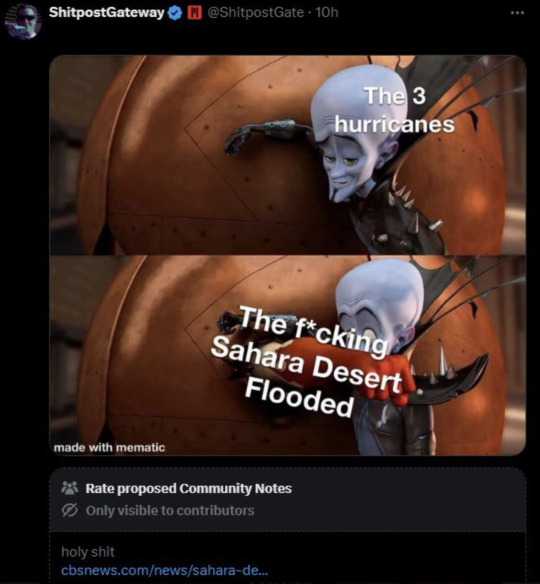
(and yes, it's real and terrifying tbh)
52K notes
·
View notes
Text
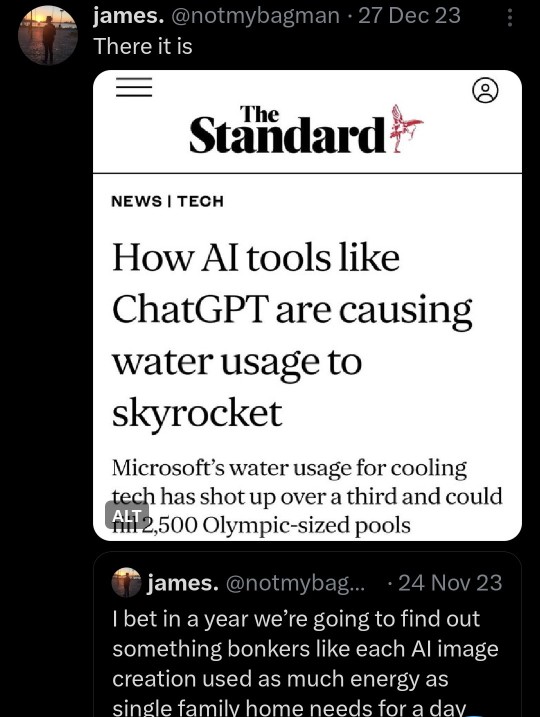
120K notes
·
View notes
Text
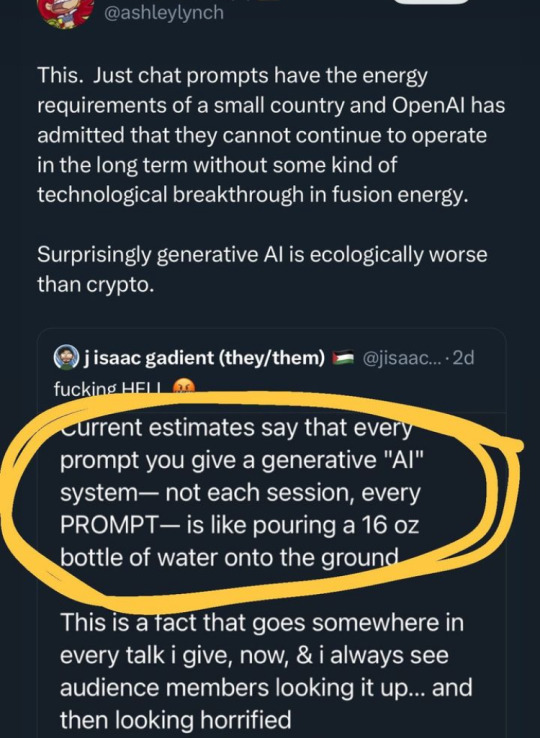
#ai#ai art#climate change#ecology#ecocide#water rights#land back#respect water treaties with First Nations#wasteland#waste#waste fraud and abuse#desertification
63K notes
·
View notes
Text








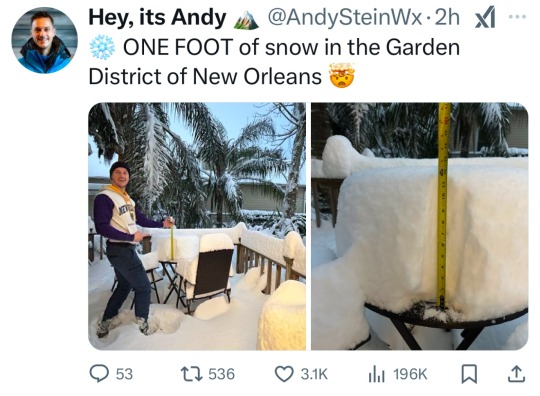
Move along, nothing to see here. Just blizzards in Florida + record snowfall in Mississippi and Louisiana + climate change.
#politics#climate change#climate crisis#climate change deniers#climate catastrophe#florida#mississippi#record snowfall#global warming
17K notes
·
View notes
Text
white americans when you tell them that the idea of climate change as an impending disaster is a reductive first world perspective because it’s a tangible reality for many in the global south already:
#climate change#im TIRED#and i’m saying this as someone who also lives in the US.#im glad that none of you have to worry about your family and friends in other countries dying because of the heat#but this idea that “oh we have to stop it before we reach the extreme” is SO STUPID#because it’s already reached the extreme in some places!!#people are dying in south asia. people are dying in southeast asia. people are dying in africa. people are dying in central america.#people are dying in south america. people are dying in island nations.#what will it take you to care about these people#or will you not care until it’s people who look like you who are dying.
47K notes
·
View notes
Text

43K notes
·
View notes
Text
We have already averted truly apocalyptic levels of global warming.
Yes, read that again. Let it sink in. This is what the science now says. We have already averted truly apocalyptic global warming.
To quote David Wallace-Wells, author of The Uninhabitable Earth, from his huge feature in the New York Times:
"Thanks to astonishing declines in the price of renewables, a truly global political mobilization, a clearer picture of the energy future and serious policy focus from world leaders, we have cut expected warming almost in half in just five years... The window of possible climate futures is narrowing, and as a result, we are getting a clearer sense of what’s to come: a new world, full of disruption but also billions of people, well past climate normal and yet mercifully short of true climate apocalypse." (New York Times, October 22, 2022. Unpaywalled here. Emphasis mine. And yes, this vision of the future is backed up by the current science on the issue, as he explains at length in the article.)
So we've already averted truly apocalyptic warming, and we've already cut expected warming IN HALF in just the past five years.
The pace of technology, of innovation, of prices, of feasibility, of discovery, of organizing, of grassroots movements, of movements in other countries around the world, have all picked up the pace so fast in the last five years.
Renewable technology and capacity are both increasing at an exponential rate. It's all S-curves, ones that look like this:

-via The Economist, June 20, 2024.
How much more will we manage in another five years? Another ten? Another twenty?
I know the US is about to fucking suck about the environment for the next four years. But the momentum of renewable energy is far too much to stop - both in the US (x) and around the world.
(Huge shoutouts to India, China, and Brazil for massive gains for the environment in renewables, and Brazil for massive progress against Amazon deforestation.)
We're going to get there.
Say it with me. We're going to get there.
#me#made this it's own post separate from the stuff about dystopia#bc the literary theory side was important framing to me but it also kind of buries the lede#global warming#climate crisis#climate change#climate catastrophe#climate action#environment#climate anxiety#good news#hope
17K notes
·
View notes
Text
Daily reminder that we do not actually live in a dystopian movie put the apocalypse down and back away slowly. You know when your cleaning a room and you pull everything out of it's draws to sort through it and you're like "what the fuck have I done I'm never going to be able to tidy all of this" I think that's the stage we're at in the world. Thanks to social media we've pulled out all the messed up shit from the cupboards of the world, it was always there but now we can see it and we're going to have to sort it all out we made this mess and we can fix it. Falling to the floor sobbing will not clean a crusty room. A group of people working systematically (preferably with music in the background) will.
60K notes
·
View notes
Text
Planet's Fucked: What Can You Do To Help? (Long Post)
Since nobody is talking about the existential threat to the climate and the environment a second Trump term/Republican government control will cause, which to me supersedes literally every other issue, I wanted to just say my two cents, and some things you can do to help. I am a conservation biologist, whose field was hit substantially by the first Trump presidency. I study wild bees, birds, and plants.
In case anyone forgot what he did last time, he gagged scientists' ability to talk about climate change, he tried zeroing budgets for agencies like the NOAA, he attempted to gut protections in the Endangered Species Act (mainly by redefining 'take' in a way that would allow corporations to destroy habitat of imperiled species with no ramifications), he tried to do the same for the Migratory Bird Treaty Act (the law that offers official protection for native non-game birds), he sought to expand oil and coal extraction from federal protected lands, he shrunk the size of multiple national preserves, HE PULLED US OUT OF THE PARIS CLIMATE AGREEMENT, and more.
We are at a crucial tipping point in being able to slow the pace of climate change, where we decide what emissions scenario we will operate at, with existential consequences for both the environment and people. We are also in the middle of the Sixth Mass Extinction, with the rate of species extinctions far surpassing background rates due completely to human actions. What we do now will determine the fate of the environment for hundreds or thousands of years - from our ability to grow key food crops (goodbye corn belt! I hated you anyway but), to the pressure on coastal communities that will face the brunt of sea level rise and intensifying extreme weather events, to desertification, ocean acidification, wildfires, melting permafrost (yay, outbreaks of deadly frozen viruses!), and a breaking down of ecosystems and ecosystem services due to continued habitat loss and species declines, especially insect declines. The fact that the environment is clearly a low priority issue despite the very real existential threat to so many people, is beyond my ability to understand. I do partly blame the public education system for offering no mandatory environmental science curriculum or any at all in most places. What it means is that it will take the support of everyone who does care to make any amount of difference in this steeply uphill battle.
There are not enough environmental scientists to solve these issues, not if public support is not on our side and the majority of the general public is either uninformed or actively hostile towards climate science (or any conservation science).
So what can you, my fellow Americans, do to help mitigate and minimize the inevitable damage that lay ahead?
I'm not going to tell you to recycle more or take shorter showers. I'll be honest, that stuff is a drop in the bucket. What does matter on the individual level is restoring and protecting habitat, reducing threats to at-risk species, reducing pesticide use, improving agricultural practices, and pushing for policy changes. Restoring CONNECTIVITY to our landscape - corridors of contiguous habitat - will make all the difference for wildlife to be able to survive a changing climate and continued human population expansion.
**Caveat that I work in the northeast with pollinators and birds so I cannot provide specific organizations for some topics, including climate change focused NGOs. Scientists on tumblr who specialize in other fields, please add your own recommended resources. **
We need two things: FUNDING and MANPOWER.
You may surprised to find that an insane amount of conservation work is carried out by volunteers. We don't ever have the funds to pay most of the people who want to help. If you really really care, consider going into a conservation-related field as a career. It's rewarding, passionate work.
At the national level, please support:
The Nature Conservancy
Xerces Society for Invertebrate Conservation
Cornell Lab of Ornithology (including eBird)
National Audubon Society
Federal Duck Stamps (you don't need to be a hunter to buy one!)
These first four work to acquire and restore critical habitat, change environmental policy, and educate the public. There is almost certainly a Nature Conservancy-owned property within driving distance of you. Xerces plays a very large role in pollinator conservation, including sustainable agriculture, native bee monitoring programs, and the Bee City/Bee Campus USA programs. The Lab of O is one of the world's leaders in bird research and conservation. Audubon focuses on bird conservation. You can get annual memberships to these organizations and receive cool swag and/or a subscription to their publications which are well worth it. You can also volunteer your time; we need thousands of volunteers to do everything from conducting wildlife surveys, invasive species removal, providing outreach programming, managing habitat/clearing trails, planting trees, you name it. Federal Duck Stamps are the major revenue for wetland conservation; hunters need to buy them to hunt waterfowl but anyone can get them to collect!
THERE ARE DEFINITELY MORE, but these are a start.
Additionally, any federal or local organizations that seek to provide support and relief to those affected by hurricanes, sea level rise, any form of coastal climate change...
At the regional level:
These are a list of topics that affect major regions of the United States. Since I do not work in most of these areas I don't feel confident recommending specific organizations, but please seek resources relating to these as they are likely major conservation issues near you.
PRAIRIE CONSERVATION & PRAIRIE POTHOLE WETLANDS
DRYING OF THE COLORADO RIVER (good overview video linked)
PROTECTION OF ESTUARIES AND SALTMARSH, ESPECIALLY IN THE DELAWARE BAY AND LONG ISLAND (and mangroves further south, everglades etc; this includes restoring LIVING SHORELINES instead of concrete storm walls; also check out the likely-soon extinction of saltmarsh sparrows)
UNDAMMING MAJOR RIVERS (not just the Colorado; restoring salmon runs, restoring historic floodplains)
NATIVE POLLINATOR DECLINES (NOT honeybees. for fuck's sake. honeybees are non-native domesticated animals. don't you DARE get honeybee hives to 'save the bees')
WILDLIFE ALONG THE SOUTHERN BORDER (support the Mission Butterfly Center!)
INVASIVE PLANT AND ANIMAL SPECIES (this is everywhere but the specifics will differ regionally, dear lord please help Hawaii)
LOSS OF WETLANDS NATIONWIDE (some states have lost over 90% of their wetlands, I'm looking at you California, Ohio, Illinois)
INDUSTRIAL AGRICULTURE, esp in the CORN BELT and CALIFORNIA - this is an issue much bigger than each of us, but we can work incrementally to promote sustainable practices and create habitat in farmland-dominated areas. Support small, local farms, especially those that use soil regenerative practices, no-till agriculture, no pesticides/Integrated Pest Management/no neonicotinoids/at least non-persistent pesticides. We need more farmers enrolling in NRCS programs to put farmland in temporary or permanent wetland easements, or to rent the land for a 30-year solar farm cycle. We've lost over 99% of our prairies to corn and soybeans. Let's not make it 100%.
INDIGENOUS LAND-BACK EFFORTS/INDIGENOUS LAND MANAGEMENT/TEK (adding this because there have been increasing efforts not just for reparations but to also allow indigenous communities to steward and manage lands either fully independently or alongside western science, and it would have great benefits for both people and the land; I know others on here could speak much more on this. Please platform indigenous voices)
HARMFUL ALGAL BLOOMS (get your neighbors to stop dumping fertilizers on their lawn next to lakes, reduce agricultural runoff)
OCEAN PLASTIC (it's not straws, it's mostly commercial fishing line/trawling equipment and microplastics)
A lot of these are interconnected. And of course not a complete list.
At the state and local level:
You probably have the most power to make change at the local level!
Support or volunteer at your local nature centers, local/state land conservancy non-profits (find out who owns&manages the preserves you like to hike at!), state fish & game dept/non-game program, local Audubon chapters (they do a LOT). Participate in a Christmas Bird Count!
Join local garden clubs, which install and maintain town plantings - encourage them to use NATIVE plants. Join a community garden!
Get your college campus or city/town certified in the Bee Campus USA/Bee City USA programs from the Xerces Society
Check out your state's official plant nursery, forest society, natural heritage program, anything that you could become a member of, get plants from, or volunteer at.
Volunteer to be part of your town's conservation commission, which makes decisions about land management and funding
Attend classes or volunteer with your land grant university's cooperative extension (including master gardener programs)
Literally any volunteer effort aimed at improving the local environment, whether that's picking up litter, pulling invasive plants, installing a local garden, planting trees in a city park, ANYTHING. make a positive change in your own sphere. learn the local issues affecting your nearby ecosystems. I guarantee some lake or river nearby is polluted
MAKE HABITAT IN YOUR COMMUNITY. Biggest thing you can do. Use plants native to your area in your yard or garden. Ditch your lawn. Don't use pesticides (including mosquito spraying, tick spraying, Roundup, etc). Don't use fertilizers that will run off into drinking water. Leave the leaves in your yard. Get your school/college to plant native gardens. Plant native trees (most trees planted in yards are not native). Remove invasive plants in your yard.
On this last point, HERE ARE EASY ONLINE RESOURCES TO FIND NATIVE PLANTS and LEARN ABOUT NATIVE GARDENING:
Xerces Society Pollinator Conservation Resource Center
Pollinator Pathway
Audubon Native Plant Finder
Homegrown National Park (and Doug Tallamy's other books)
National Wildlife Federation Native Plant Finder (clunky but somewhat helpful)
Heather Holm (for prairie/midwest/northeast)
MonarchGard w/ Benjamin Vogt (for prairie/midwest)
Native Plant Trust (northeast & mid-atlantic)
Grow Native Massachusetts (northeast)
Habitat Gardening in Central New York (northeast)
There are many more - I'm not familiar with resources for western states. Print books are your biggest friend. Happy to provide a list of those.
Lastly, you can help scientists monitor species using citizen science. Contribute to iNaturalist, eBird, Bumblebee Watch, or any number of more geographically or taxonomically targeted programs (for instance, our state has a butterfly census carried out by citizen volunteers).
In short? Get curious, get educated, get involved. Notice your local nature, find out how it's threatened, and find out who's working to protect it that you can help with. The health of the planet, including our resilience to climate change, is determined by small local efforts to maintain and restore habitat. That is how we survive this. When government funding won't come, when we're beat back at every turn trying to get policy changed, it comes down to each individual person creating a safe refuge for nature.
Thanks for reading this far. Please feel free to add your own credible resources and organizations.
#us election#climate change#united states election#resources#native plants#this took 3 hours to write so maybe don't let it flop? i know i write long posts. i know i follow scientists on here#that study birds and corals and other creatures#i realize i did not link sources/resources for everything. i encourage those more qualified to add things on. i need to go to work
18K notes
·
View notes
Text

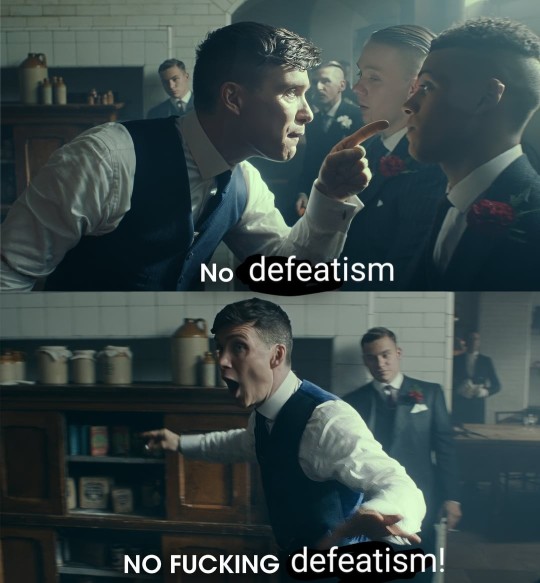
#tiktok#donald trump#fuck trump#trump#trump is a threat to democracy#trump is the enemy of the people#trump is a criminal#trump is the antichrist#tw religious themes#tw religion#trump is a felon#climate change#la wildfires#us politics#us presidents#us border#immigration#trump's inauguration#climate crisis#climate action#climate catastrophe#doge
11K notes
·
View notes
Text


benandjerrys on Instagram
#ben and jerrys#ben and jerry's ice cream#election 2024#project 2025#black lives matter#blm movement#hope#hopecore#united states#us politics#donald trump#elon musk#gen z#positivity#happiness#climate justice#climate change#greta thunberg#save palestine#save our planet#sustainability#vegan#vegetarian#liberals#booklr#bookworm#banned books#blacklivesmatter#leftist#leftism
9K notes
·
View notes
Text

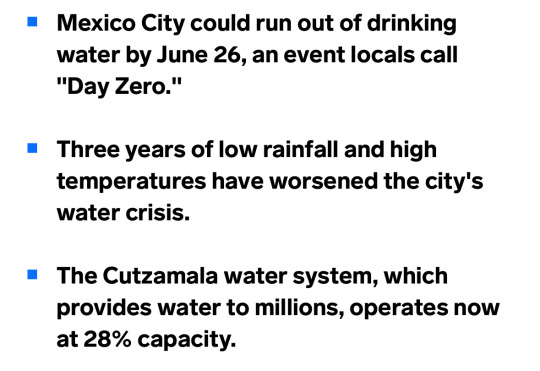
Source
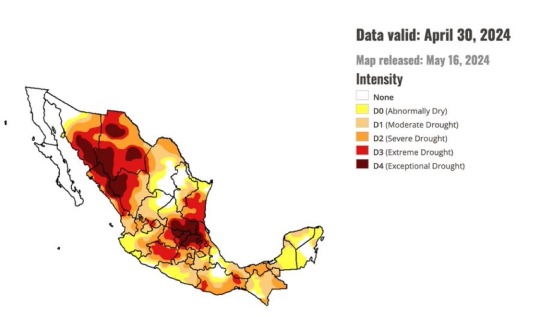
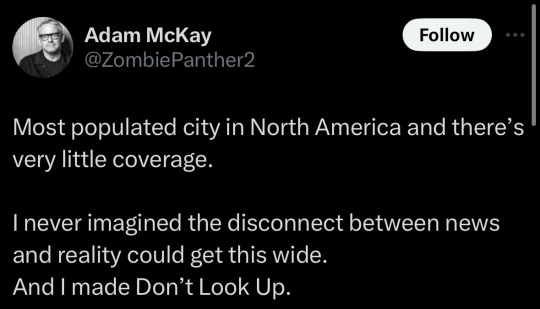
Source
#environment#Mexico#news#climate change#government#the left#progressive#twitter post#activism#current events#drought#environmentalism
28K notes
·
View notes




